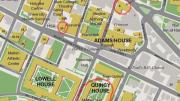The College has announced the Harvard-owned properties that will be used for undergraduate residences during the renovation of part of Quincy House during the 2012-2013 academic year—a prototype, announced in January, for renovation of all the Houses, one of the most ambitious University capital projects planned for the foreseeable future. Old Quincy, now home to 180 students, will need to be vacated for 15 months. According to an announcement by Faculty of Arts and Sciences (FAS) dean Michael D. Smith and College dean Evelynn M. Hammonds, the students—identified through the rooming lottery process in the spring of 2012 along with their Quincy House peers—will occupy Hampden Hall, at 8 Plympton Street (next to Grolier Poetry Book Shop and, on the Massachusetts Avenue side, above the Harvard Book Store); Fairfax Hall at 1306 Massachusetts Avenue (almost directly opposite the rear entrance to Widener Library, and over Leavitt & Peirce, the venerable tobacconist); and Ridgely Hall, at 65 Mount Auburn Street (facing Lowell House and the Harvard Community Garden). Students will continue to dine in Quincy House.
Smith said that while the prototype enables FAS to test design and construction issues, the College will "ensure that we maintain a vibrant House life" for the swing-space residents during Old Quincy renovation.
According to FAS, the three buildings the undergraduates will use are now occupied largely by graduate students, and the units typically turn over from year to year. Current residents who wish to move to another Harvard-owned apartment will be given assistance and priority in doing so. The newcomers may find some of the amenities in their temporary quarters attractive: the apartments are described as equipped with en suite bathrooms, kitchens, and cable television hookups.









